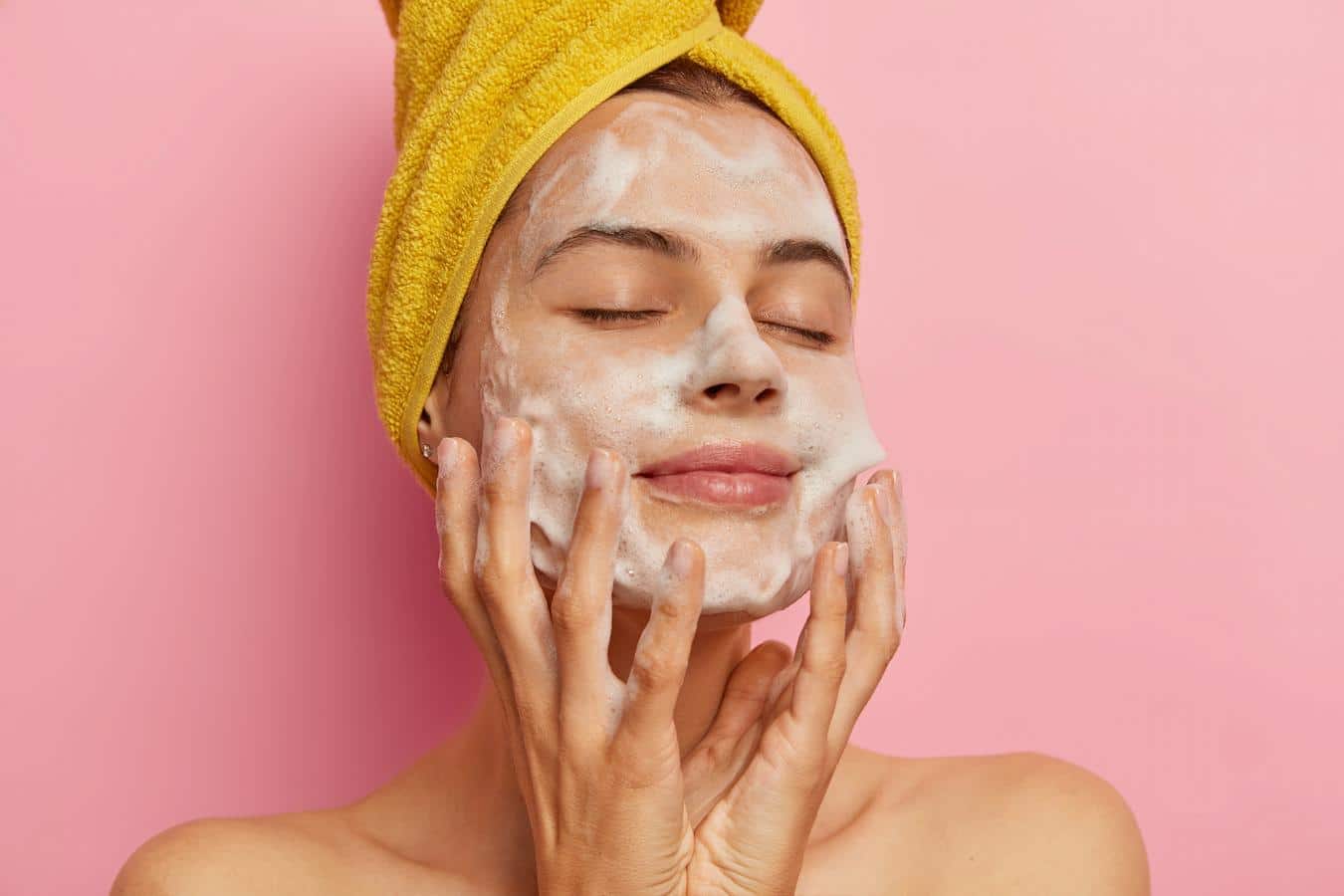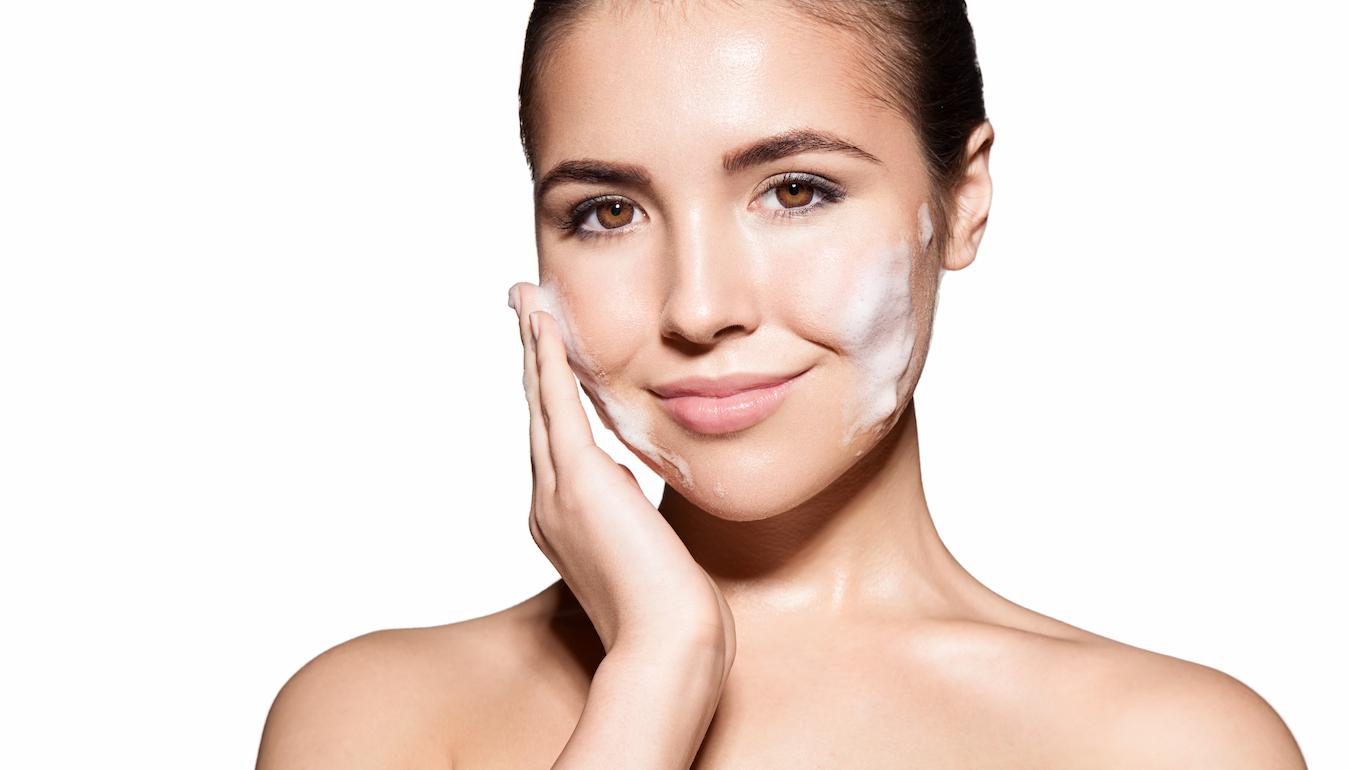What Is The Best Face Wash For Sensitive Skin?
Keeping sensitive skin in good shape can be difficult, especially with acne or other skin diseases like eczema. Even small changes to your diet, an hour in the sun, or using a new product in your skincare routine can cause breakouts and rashes.
So if you want to improve the condition of your skin, you must be cautious while picking products containing chemical-based ingredients.

Even though this might be annoying, it’s worth looking into. Because the right treatment could help you with some of your problems and make your skin look better.
When caring for sensitive skin, the first thing you should do is clean your face with a gentle cleanser. When cleansing, you should use a highly effective face wash that is designed with sensitive skin types in mind.
In this post, we’ll discuss the top ingredients to look out for when choosing a gentle facial cleanser for your sensitive skin, what to avoid, and tips on how to prevent breakouts if you have sensitive skin.
Your vital first step is to use a gentle cleanser (water-based is a great place to start) that won’t result in irritated skin. As always, if you are experiencing extreme skin issues, or have skin concerns, it is always best to seek out the guidance of a board-certified dermatologist.
See Related: A Guide On How To Get Clear Skin
Top Tips to Prevent Breakouts If You Have Sensitive Skin
- Wash your face twice daily with a gentle skin cleanser (water-based and cruelty-free).
- Avoid using greasy or heavy lotions and cosmetics.
- Stay away from cleansers that use artificial fragrances.
- Make sure to choose a moisturizer that won’t cause your pores to get clogged.
- Don’t touch your acne or pinch your zits.
- Have a healthy diet (fruits and vegetables)
- Avoid greasy, fried foods, and other harmful fast food options.
- Try not to touch your face so often and stay as far away from direct sunlight as possible.
- Drink at least 6 glasses of water daily.
- Maintaining a regular fitness routine (and be sure to gently cleanse your skin after every workout).
Top Face Cleanser Ingredients If You Have Sensitive Skin
Aloe Vera
People with irritated skin should definitely use aloe vera. It is a common ingredient in face washes for sensitive skin as well as toners and moisturizers.
Since the plant has cooling properties, it may help reduce redness, infections, rashes, and irritations. Aloe vera’s antifungal acemannan compounds make it easier to treat skin conditions that cause inflammation, like cysts and hot boils.
Salicylic Acid
Salicylic acid, a member of the beta-hydroxy acid (BHA) family, is a potent exfoliator that may remove the top layer of dead skin cells by penetrating deep into the pores and opening them up. In addition, it helps to remove excess oil that has built up on your skin causing oily skin.
Sunflower Seed Oil
Sunflower oil is good for all kinds of skin, including dry, sensitive, oily, and combination skin. It is also good for aging skin. Sunflower oil is a great way to treat dry skin because it moisturizes the skin and leaves you with a younger-looking complexion.

Sunflower oil may also help people with sensitive skin conditions because it keeps the skin moist, protects it, and calms the skin down.
These natural oils can be used on many different skin types, and they are often great for makeup removers. However, people with acne-prone or very sensitive skin will benefit the most from them.
It’s possible that sunflower seed oil may act as a good acne treatment as it kills bacteria and reduces inflammation.
Jojoba Oil
Jojoba oil is a botanical extract with antimicrobial properties that prevent the growth of germs. Additionally, it helps the body repair any damage while also reducing inflammation.
It also helps keep skin hydrated. As a result, it may help prevent breakouts and promote the healing of mild acne.
Given its mild nature, jojoba oil is often recommended to patients suffering from sensitive skin disorders such as eczema and psoriasis. When applied to sensitive skin, jojoba oil has the potential to prevent flare-ups from occurring.
Glycolic Acid
The use of glycolic acid is very effective in the removal of dead skin. It also reduces inflammation and protects your skin from the potentially destructive effects of UVB radiation.
It doesn’t hurt most types of skin, but it works best on skin that is oily or prone to acne. Be wary of including this in your everyday routine if you have rosacea, eczema, or dry or sensitive skin. These factors may increase the likelihood of your skin becoming inflamed.
Shea Butter
Shea butter is an excellent option for calming the skin and restoring its natural moisture. It relaxes irritated, flaky, and inflamed skin while also preventing skin from drying out. Since it’s mild, shea butter is a great option for those with sensitive skin.
Given that it absorbs fast into the skin, shea butter may be able to help you gain immediate relief from flare-ups. Raw shea butter is an effective remedy for a variety of skin conditions, including the scars left behind by acne.
Tea Tree Oil
Tea tree oil is an efficient therapy for acne and a wide range of other skin conditions. Its anti-inflammatory and antibacterial qualities make it particularly useful in combating acne.
Recently, tea tree oil has seen a meteoric rise in popularity. This is why more and more people are putting it directly on their skin to try to treat acne as well as other skin problems.
On the other hand, you should never put the essential oil on your skin without first diluting it with a suitable carrier oil. This is because essential oils are very potent and may cause severe skin irritation.
Chamomile Flower
Chamomile can kill bacteria and viruses and help reduce inflammation when used as a part of a treatment. On top of that, it may get rid of the elements that cause the skin to become irritated.

Chamomile is a great way to treat dry and sensitive skin because it has healing effects that aren’t too harsh but are still very effective. Chamomile may be found in many skin care products, so make sure to look out for this ingredient when buying facial cleansers.
Camellia Leaf Extract
Camellia leaf extract can be good for the skin in a number of ways, whether or not it has been oxidized. Its unique properties keep the skin from aging, can reduce inflammation, get rid of bacteria, and make the skin appear more supple.
It is often found in face washes for sensitive skin as it helps to restore the skin’s natural moisture.
Given all these factors, it can be used to keep the skin in good health. The Camellia plant is used to make white tea. This tea is good for people with acne-prone skin and helps keep the skin moist.
This ingredient is great for acne-prone skin and sensitive skin because it’s both non-comedogenic (a fancy word for “won’t clog your pores”) and anti-inflammatory. This can also be used to speed up the healing process after injuries like cuts and scrapes.
Sulfur
Most people who have trouble with sensitive skin can benefit from sulfur. People with sensitive skin are often told to give it a try because it’s one of the mildest acne treatments.
Sulfur may be able to help treat acne, and it can also be used to get rid of blackheads and whiteheads as it deeply cleanses pores. It does this by removing dead skin, which makes the pores more prominent.
Glycerin
People with sensitive skin types can also benefit from glycerin. Since it’s a botanical extract, it works to make redness and swelling visually appealing. It’s one of the most soothing things you can find in skin care products, and using these products regularly over time may help your skin become less sensitive.
Glycerin is an excellent product because it is suitable for many different types of skin and works well with many other skincare routines. It’s a light moisturizer that doesn’t clog pores and helps dry skin feel better. These are all advantages of using this product, so make sure to keep this one in mind.
Lactic Acid
It’s well known that lactic acid is a good ingredient for treating acne. It gets rid of dead skin cells, a big reason why pores can get clogged up and lead to acne.
Lactic acid can be used on sensitive skin if the proper concentration is used. Before you purchase a product with lactic acid, consult your dermatologist first. This way, you’ll know the right concentration to use.
Hyaluronic Acid
Even those with sensitive skin or a history of acne may benefit from including hyaluronic acid in their daily skincare routine. This is because hyaluronic acid has a natural hydrating formula that helps to keep moisture in the skin while simultaneously repairing damaged skin. If you are an expecting mom or breastfeeding, you may also use the acid topically.

It relieves joint pain, brings down swelling, and lowers the risk of infection all at the same time. It’s possible that when applied to the skin in the form of a gel or essence, it will help the skin recover while also minimizing the appearance of acne, bolstering the skin’s barrier, protecting it from irritants and germs that may cause further harm, and enhancing the skin’s defenses.
Retinol
Retinol, a vitamin A compound that promotes skin cell turnover, may reduce the number of blackheads, whiteheads, and even deeper, more severe pimples. This is because retinol facilitates the replacement of old skin cells with new ones.
It’s important to remember that adjustments may need to be made in regard to how retinol is used. Pay attention to the concentration, quantity, and frequency of use with retinol.
Bonus: What Does Hyaluronic Acid Do For Acne?
3 Face Wash Ingredients to Avoid if You Have Sensitive Skin
1. Fragrance
People still argue about whether or not a certain fragrance in personal care products is good for your health. Many skin care professionals advise patients to stay away from fragrance-enhanced cosmetics or skin care. In essence, they’re encouraged to always opt for fragrance-free.
There are a lot of people who don’t think it’s that important. But if you want to be safe and stick to the side of caution, you shouldn’t use scented face cleansers, especially if you have sensitive skin.
Keeping this in mind is especially important if you have acne. Some products have fragrances put in them to cover up the smell of other substances they contain. The problem, however, is that the scent is a mix of natural and synthetic ingredients.
The chemicals used to create the scent are not revealed on the label of your goods since all of the components of the odor are blended and branded “fragrance.”
Since you don’t know what’s in a product, you can’t tell if it will irritate your skin or cause a breakout. If you don’t want to risk your health, use face and body care products that are free from fragrance.
2. Alcohol
In case you didn’t know, a lot of the skincare products on the market today have alcohol in them. If you use skin care products that contain alcohol, your skin may feel dry instead of oily.
Products that contain alcohol often leave your skin feeling tight instead of leaving your skin feeling healthy and hydrated. On top of that, it dries the skin very quickly and makes it feel like it has no weight.

But the last thing you want to do if you have sensitive skin is use products that are stripping the skin of its natural oils.
Your skin will lose its protective layer, making it more likely to itch, get too dry, and get wrinkles. Given this, it’s strongly suggested that you don’t use any skincare products, especially face cleansers, that contain alcohol in any way.
Isopropyl alcohol and denatured alcohol are two types you should avoid when looking for face wash ingredients, especially if you have sensitive skin.
3. Harsh exfoliants and scrubs
Recent years have seen an uptick in the popularity of exfoliating face washes. That’s because you’ll be able to spend less time on your skincare routine, which will save you money.
However, some of these cleansers and scrubs use abrasive grains—like walnut shells or apricot kernels—to help in the removal of dead skin.
These granules are what give these treatments their exfoliating power. Unlike round components, they may cause greater damage to your skin because of their irregular form.
Since they are so abrasive, there is a chance that they may develop microscopic rips in your skin. Therefore, if your skin is easily irritated, you should refrain from doing so.
Conclusion
Having sensitive skin can be very challenging. But one of the best ways to prevent your skin from becoming even more sensitive is to have a healthy skin care routine that incorporates a gentle cleanser, a toner, and an anti-aging moisturizer that won’t cause dry skin.
We hope that this post has helped you gain insight into what ingredients to look for in face wash and what to avoid. Before you buy any skin care product that makes any claims to treat a skin condition, be sure to look for the National Eczema Association seal, or for Board Certified Dermatologist based products. That way, you’ll have a professional with you on your skincare journey.
Keep Reading: What Is A Lip Exfoliator?
—
For over 60 years, Viviane Woodard has represented “The Purity of Skincare”. We are the leading beauty brand for skin care products and promote the importance of good skin hydration. Follow us on Facebook, Instagram, Twitter, and Pinterest for skin care tips, product discounts, and more.
